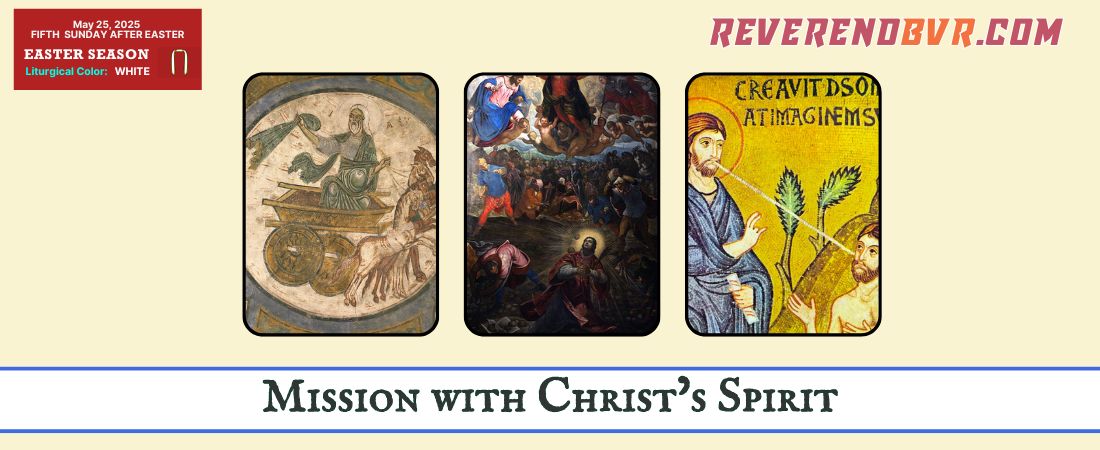Christ’s mission continues through us—not by human strength, but by the Spirit’s power. Like Elisha, Stephen, and the apostles, we are called to witness boldly, live joyfully, and serve faithfully in the Spirit of Christ.
Sermon Title: Mission with Christ’s Spirit.
Occasion: 5th Sunday after Easter | May 25, 2025, Sunday.
Bible Readings: 2 Kings 2:9–16; Psalm 105; Acts 7:54–60; Matthew 28:16–20.
Original Language Reflections (For deeper study, refer to the Table of Hebrew and Greek Terms in Section 9 of the sermon).
Website: www.reverendbvr.com
Introduction: Called to Continue the Mission
In the great narrative of Scripture, the theme of succession—of mission handed down from generation to generation—is a divine pattern. From Elijah to Elisha, from Jesus to the apostles, and through the apostles to us, the Spirit of the living God empowers the Church to carry forward the mission of God in the world. Today, we reflect on what it means to live out our faith in Mission with Christ’s Spirit.
Mission is not human activism; it is the Spirit-empowered continuation of the incarnate Christ’s own work in the world. As John Stott notes, “The Spirit was given not to bless the Church’s status quo but to propel it into the world” (The Spirit, the Church and the World).
1. The Double Portion: Inheriting the Spirit for the Mission (2 Kings 2:9–16)
In 2 Kings, Elisha’s request is striking: “Let me inherit a double portion of your spirit.” This is not a selfish desire for power, but a deep yearning to be faithful to the prophetic mission in continuity with Elijah. Elisha knew the weight of the mantle he would bear.
In Hebrew tradition, the“double portion” (Hebrew: פִּי־שְׁנַיִם, pi shenayim) was the right of the firstborn (Deut 21:17), a symbolic expression of full inheritance. Elisha’s ministry begins not with self-confidence, but with dependency on God’s Spirit (רוּחַ, ruach). And it is this same Spirit that parts the Jordan River, affirming that God’s mission continues through Elisha.
Just as Elisha asked for Elijah’s spirit, we as the Church are invited to seek the Spirit of Christ (πνεῦμα Χριστοῦ, pneuma Christou) —not for personal glory, but to carry out the mission of making God’s reign known in the world.
2. Proclaiming His Wonders: The Praise of a Missional People (Psalm 105)
Psalm 105 calls us to a posture of praise and remembrance. “Give praise to the Lord, proclaim his name; make known among the nations what he has done” (v.1). Mission is not simply about tasks or geographic expansion—it is about testimony.
The psalmist intertwines memory and mission. Remembering God’s covenant, His faithfulness to Abraham, Isaac, and Jacob, motivates the people to go forth and proclaim. It is not merely a liturgical act, but a missional one—praising God in a way that transforms the nations.
The Church, as the new Israel, becomes the voice that remembers and proclaims God’s mighty deeds in Christ—culminating in the resurrection and the sending of the Spirit.
3. Witness in the Face of Opposition: Stephen and the Power of the Spirit (Acts 7:54–60)
Stephen, the first Christian martyr, is portrayed in Acts as a Spirit-filled man—full of wisdom, grace, and courage. As the Sanhedrin turned against him, he “looked up to heaven and saw the glory of God” (v.55). He did not shrink from his calling; he embodied the very mission of Christ: speaking truth in love, even unto death.
Stephen’s final words echo Jesus on the cross: “Lord, do not hold this sin against them.” This radical forgiveness, this Christ-like heart, is possible only through the indwelling Holy Spirit. (πνεῦμα ἅγιον, pneuma hagion). The term “witness” (μάρτυς, martys) in the New Testament came to mean not just one who testifies, but one who testifies even at the cost of life. Stephen is thus both preacher and proto-martyr.
The mission of the Church is not without suffering, rejection, or cost. But we do not go alone. We go with the Spirit of Christ—the one who stood with Stephen in the hour of trial and stands with us now.
4. The Great Commission: Our Mandate from the Risen Christ (Matthew 28:16–20)
The Risen Lord’s commission is clear: “Go and make disciples of all nations…” (v.19). This is not a suggestion, but a divine mandate, backed by the authority (ἐξουσία, exousia) of the Risen Christ and sustained by His presence: “I am with you always.”
This passage connects power, purpose, and presence:
- Power – “All authority in heaven and on earth has been given to me” (v.18).
- Purpose – “Make disciples… baptize… teach” (v.19–20).
- Presence – “I am with you always, to the very end of the age” (v.20).
In other words, Christ does not send us out alone; He breathes His Spirit upon us (cf. John 20:22), just as Elisha received Elijah’s cloak, and just as Stephen saw heaven opened.
As David Bosch notes in Transforming Mission, “Mission is not primarily an activity of the church but an attribute of God.” We join a mission that is already God’s.
5. Living the Mission Today
What does this mean for us today?
- In our workplaces and families, we are witnesses (μάρτυρες, martyres) to truth, love, and grace.
- In our communities, we proclaim God’s justice and mercy—not in words alone, but in action.
- In times of uncertainty, we trust the Spirit to guide (ὁδηγέω, hodēgeō), empower, and comfort us.
Mission is not reserved for missionaries abroad—it is the calling of every disciple. It is the boldness to speak like Stephen, the humility to receive like Elisha, the joy to praise like the psalmist, and the faith to go as Christ commands.
6. Conclusion: The Spirit Resting on Us
In 2 Kings 2:15, the prophets say, “The spirit of Elijah is resting on Elisha.” What if the world could say of us, “The Spirit of Christ is resting on them”?
May we be a Church marked not by fear, but by faithful obedience to the mission entrusted to us. May the double portion of Christ’s Spirit empower us to cross our own Jordans, to proclaim the gospel, and to embody the kingdom of God on earth.
7. Summary Table
| S. No | Scripture | Theme | Application |
| 1 | 2 Kings 2:9–16 | Inheritance of the Spirit | Seek God’s Spirit (רוּחַ, ruach) for the mission, not personal gain |
| 2 | Psalm 105 | Praise as witness | Remember and proclaim God’s works in our lives |
| 3 | Acts 7:54–60 | Spirit-empowered witness amidst opposition | Stand firm in truth and love, even in suffering (μάρτυς) |
| 4 | Matthew 28:16–20 | Christ’s commission and presence | Live missionally, assured of Christ’s authority (ἐξουσία) and spirit |
8. Let us Pray:
Gracious and Ever-Living God,
You who called Elisha to follow in Elijah’s path, You who strengthened Stephen to witness even unto death, And You who gave us Your Spirit through the Risen Christ— Fill us anew with holy courage, with hearts that remember, With voices that proclaim, and with hands ready to serve. Help us to carry Your mission into the world— With faith, with power, and with love.
In the name of the Father, and of the Son, and of the Holy Spirit. Amen.
9. Learn Words from the Original Scriptures (For deeper understanding and meditation on today’s theme)
| S. No | Term – Click on each term to view its lexical details | Language | Transliteration | Meaning in English/ Usage |
|---|---|---|---|---|
| 1 | פִּי־שְׁנַיִם (pi shenayim) | Hebrew | pi shenayim | Double portion – symbolic of inheritance |
| 2 | רוּחַ (ruach) | Hebrew | ruach | Spirit, breath, wind – God’s empowering presence |
| 3 | πνεῦμα Χριστοῦ | Greek | pneuma Christou | Spirit of Christ |
| 4 | πνεῦμα ἅγιον | Greek | pneuma hagion | Holy Spirit |
| 5 | μάρτυς (martys) | Greek | martys | Witness, one who testifies (even unto death) |
| 6 | ἐξουσία (exousia) | Greek | exousia | Authority, delegated power |
| 7 | ὁδηγέω (hodēgeō) | Greek | hodēgeō | To guide or lead |
| 8 | μάρτυρες (martyres) | Greek | martyres | Plural of martys – witnesses |
10. Bibliography
- Brueggemann, Walter. Prophetic Imagination. Fortress Press, 2001.
- Wright, N. T. Matthew for Everyone: Part 2. SPCK, 2004.
- Keener, Craig S. Acts: An Exegetical Commentary, Vol. 2. Baker Academic, 2013.
- Goldingay, John. Old Testament Theology: Israel’s Gospel. IVP Academic, 2003.
- Stott, John. The Message of Acts: The Spirit, the Church & the World. IVP, 1994.
- Bauckham, Richard. The Theology of the Book of Revelation. Cambridge University Press, 1993.
© 2025 ReverendBVR.com | High-Academic Sermon Series, 2025.
Content licensed under Creative Commons Attribution-NonCommercial-NoDerivatives 4.0 International (CC BY-NC-ND 4.0). You are free to share — copy and redistribute the material in any medium or format with proper attribution. No commercial use or modifications allowed without explicit permission.
For further sermons and biblical reflections, please visit 🌐 www.reverendbvr.com/sermons

